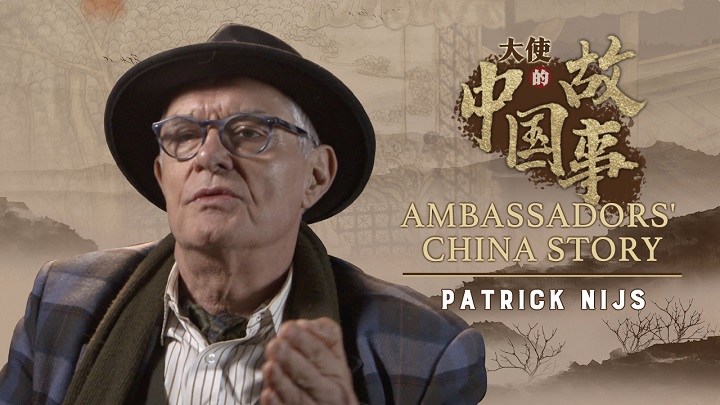Taoist Ecological Thought and the West’s Concept of Permaculture:
Interview with former Belgian Ambassador to China
Patrick Nijs is a former Belgian ambassador to China, and lifetime honorary ambassador and co-founder of the EU-China Joint Innovation Center in Brussels. He has been a witness to China’s reform and opening up since 1997, when he first came to China. A staunch environmentalist, he chose to stay in China and work in the environment sector after his term as the Belgian ambassador ended in 2013. Combining Taoist ecological thought with the Western concept of permaculture—sustainable agriculture for a lifestyle at harmony with nature—he has built a farm on wasteland, restoring the land after seven years’ effort.
In 2013, Patrick Nijs bid farewell to his diplomatic career and returned to his wife Deng Minyan’s hometown, a place called Dongchuan in the city of Kunming in southwestern China.
Combining Taoist ecological thought with the Western concept of permaculture—sustainable agriculture for a lifestyle at harmony with nature—he has built a farm on wasteland, restoring the land after seven years’ effort.
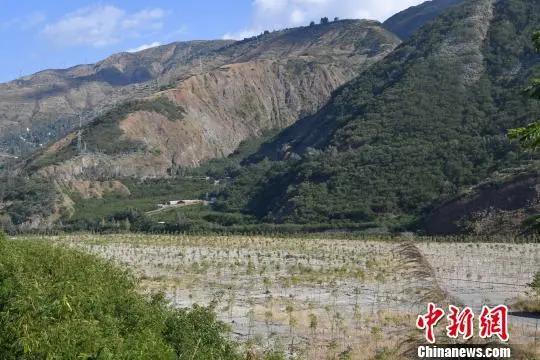
File Photo: Green mountains in Dongchuan (Photo: Liu Ranyang/China News Service)
CNS: Dongchuan has a history of copper mining for more than 2,000 years, due to which its ecology suffered serious damage. What made you engage in permaculture there?
Patrick Nijs: The idea of permaculture came from Australian ecologists Bill Mollison and David Holmgren. To deal with the problems caused by rapidly expanding and highly destructive industrialized agriculture, they thought about how to develop a more stable agricultural system. They thought industrialized agriculture had poisoned land and water sources and reduced biodiversity. They observed that plants naturally grew in “mutual-aid communities,” so they developed special agricultural strategies and community planning methods accordingly, the gist of which was combining appropriate elements to make them complement each other and exist forever.
Dongchuan suffered serious ecological damage due to long-term copper mining, and lacked enough vegetation to regulate the climate, so it became one of the areas most affected by climate change. I chose a wasteland here, hoping to create a permaculture system to change the destructive industrial norms, and guide people to treat land with the concept of tolerance and reciprocity. I believe that combining natural elements can make production and life easier. Here I don’t plow, fertilize, use pesticide or deworm because plowing will destroy the ecological balance of the soil, and fertilization will pollute the environment. We should follow the rules of nature and listen carefully to the voice of each species to produce ecological and organic agricultural products.
After seven years, the land changed significantly in 2020. Roses began to bloom without pesticides and fertilizers; the vegetables flourished; and the fruit trees bore fruit while earthworms, several centimeters long, reappeared. These were the results of soil improvement.
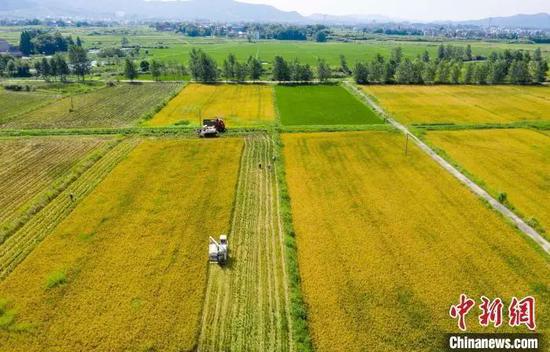
File Photo: Farmers harvest early rice in the field. (Photo: Fu Jianbin/China News Service)
CNS: Do you think permaculture is feasible in China?
Patrick Nijs: Taoism’s idea of “the way of nature” coincides with the idea of permaculture. Therefore there is a foundation for the Chinese to understand and accept permaculture.
“The way of nature” is the philosophy of Laozi, the founder of Taoism. The physical environment is fathomless and full of vitality, and the vitality of nature far exceeds human intelligence and understanding. This leads to an important concept of Taoism, “follow the trend”; that is, human beings should trust the guidance of nature, be respectful of nature and follow her rules instead of confronting her.
In Dongchuan, I saw that the local government had a clear understanding of the ecological condition and problems. They have a strong will to improve the ecological environment and used that will and listened to my suggestions. In recent years, Dongchuan has made a lot of effort to restore and protect forests, and some methods are refreshing. They have a special tree planting plan and are also innovating the garbage disposal method.
In fact, permaculture is actually the re-elaboration and practice of Taoism. I really hope that Chinese farmers will accept the concept. But it takes time and is limited by conditions, so I respect their choice.
CNS: You have done a lot of research on Taoist culture. What is the significance of the Taoist ecological concept for China’s current drive to develop an ecological civilization?
Patrick Nijs: China boasts a broad and profound culture. Taoism, as an extremely important part of the traditional culture, contains rich ecological protection ideas.
From 1978 to 2011, Chinese policymakers paid more attention to economic growth data. This is normal, because all countries in the world paid scant attention to eco-environmental protection in the early stage of their development. But during the 12th Five-Year Plan period from 2011 to 2015, China gave extra weight to ecology. At present, economic growth is still very important but China is guiding its development with the ecological civilization concept, which means we should respect nature, follow her rules and protect her. Respecting nature is the fundamental idea of scientific development; following her rules is the decision-making principle; protecting nature is a practical requirement.
The thoughts in Chinese traditional culture, especially “the Tao begets all things of the world,” “the law of the Tao is its being what it is” and “to govern by doing nothing that goes against nature” coincide with respecting nature, following her ways and protecting her, which has profound practical significance for building an ecological civilization in China and even the whole world today.
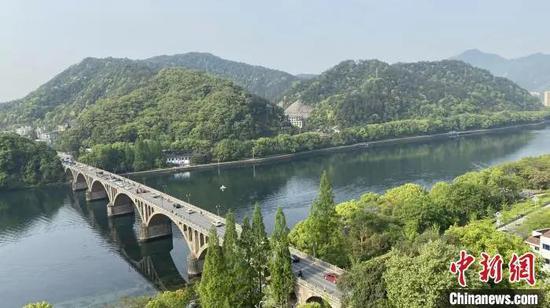
Lucid waters and lush mountains in Zhejiang Province. (Photo: Qian Chenfei/China News Service)
CNS: How does Europe view China’s ecological civilization concept and development?
Patrick Nijs: China regards ecological civilization construction as fundamental to sustainable development, and will strive to peak carbon dioxide emissions before 2030 and achieve carbon neutrality before 2060. President Xi Jinping made a statement at the 76th session of the United Nations General Assembly that China would step up support for other developing countries in developing green and low-carbon energy, and would not build any more new coal-fired power projects abroad.
This is good news for the world, but Europe may not be aware of this profound change in China. Regrettably, many Europeans think that China still follows its old mode of development, and that the Chinese know little about ecology.
China has a vast territory and a huge population, so it’s very difficult to run such a country. And it is switching from measuring GDP to green growth. This is not easy and takes time, but it’s changing rapidly. I have great confidence in its ecological civilization construction. Facts have proved that China is undergoing rapid ecological changes.
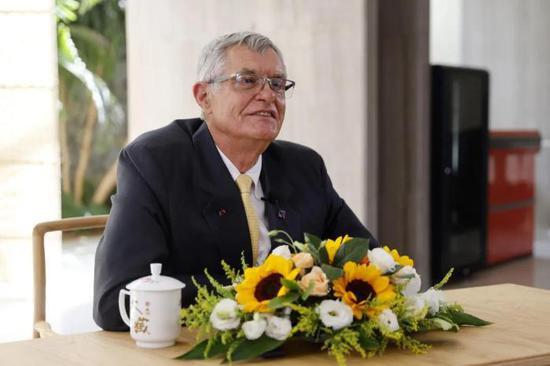
Patrick Nijs
CNS: How do China and Europe differ in ecological civilization construction? How can they work together to create a better world?
Patrick Nijs: In Europe, the shift in ecological consciousness started from the people, and some behaviors harmful to ecosystems have been changed to stop the waste of natural resources. But this is far from enough, and the government must take the lead to improve the ecological environment. In China, creating ecological awareness is a top-down process, and government officials already have ecological awareness, though many people don’t. The foundation of China’s ecological civilization construction is that all people should follow the concept of respecting and protecting nature.
China has a strong government, so it can mobilize and organize the people quickly on a most extensive scale, which is an important advantage. The government is leading the people to improve the ecological environment in various ways. Although it took the wrong path in the past, it’s seeking solutions suitable for its national conditions and working in the right direction.
Both China and Europe are concerned about the ecological condition, and they cooperate on an equal footing in the area of ecological environment. It is very important for Europe to maintain cooperation with China, which will contribute more wisdom and solutions to the world’s ecological civilization construction. This is also the reason why I live in Dongchuan, combine Taoist ecological thought with the Western concept of permaculture and put it into practice.
Source: Ecns.cn, Feb 22, 2024. https://www.ecns.cn/news/cns-wire/2024-02-26/detail-ihcychvt6111303.shtml
By Miao Chao, Luo Jie & Xie Ying from CNS; Edited by Wang Zonghan
See also: https://news.cgtn.com/news/2020-12-09/Ambassadors-China-Story-Patrick-Nijs-W52Rrk8nx6/index.html
